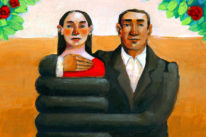
“The biggest problem for humanity, not only on a global level, but even for individuals, is misunderstanding.” ~Rinpoche
Someone cuts you off in traffic.
What a jerk!
A date stands you up.
She obviously doesn’t like you.
Your colleague gives you a dirty look across the room.
Your last email must have really pissed him off!
In so many places in our lives, we see a behavior and automatically make a meaning out of it. Everything from a glance to an email gets snappily run through our minds and attached to a reaction or feeling.
Part of this is biological. As animals, we’re built to rapidly process information so that we can react quickly, if need be. It’s how survival instincts work.
However, most things we’re reacting to aren’t life-or-death level situations.
Here’s how I work with my own brain to stop getting so upset by all these little situations. I call it “Alternate Stories.”
Every time something happens that starts to get me feeling negative, judgmental, sad, or angry, I tell myself an alternate story about what might’ve been going on for the other person.
For example, say a person cuts me off in traffic.
My first response is to think, “Hey, look out, jerk!” And then I could proceed to get mad, feel my adrenaline rise, and start tailgating that car, just to show him he can’t treat me like that.
But before I take any action or speak, I think to myself, “Is there any other possible reason that guy could have made that lane change right in front of me?”
- Maybe he’s on the phone hearing news that someone in his family just had to go to the hospital and is totally not paying attention.
- Maybe he’s trying to get to the hospital because he’s having chest pains.
- Maybe he’s had a horrible day and his wife left him and he’s totally disconnected from anything besides his own pain.
- Maybe he’s just had a bug fly into his eye.
- Maybe he really looked in his mirror and thought he saw no one there.
- Maybe he’s really nervous on the freeway and just made a mistake.
- Or maybe he really is a jerk.
Maybe, but I just can’t know. As you can see from my list of maybes, there’s no way for me to know what’s going on with anybody else as they do whatever it is they’re doing.
(Sure, I may have really good guesses sometimes, but the point of this is this: none of us can ever know for sure what’s going on with anyone else. Unless we ask them, and sometimes even then we can’t be sure.)
Going through some alternate stories whenever I feel reactionary helps me to remember that I can’t know what’s up with that other person. And that sometimes my behavior could look just as annoying to someone else, even if I didn’t mean it that way at all.
The power of the Alternate Story technique is that it reconnects me to my compassion, my sense of “Oh, yeah, sometimes I do that, too.”
If I don’t know for sure that he meant to run me off the road, it’s easier for me to allow space in my heart for him.
And at the same time, it helps me to detach from my belief that I know anything. In this place of unattachment, rather than having to soothe my hurts or calm my anger, I realize that I am free.
Photo by Bindaas Madhavi.
About Rachel Whalley
Rachel Whalley is a psychotherapist and energy healer in Seattle, WA. She helps people who are struggling with body image and self-esteem issues connect with their whole and healed Selves. She also teaches folks about the personality system called the enneagram.













 Though I run this site, it is not mine. It's ours. It's not about me. It's about us. Your stories and your wisdom are just as meaningful as mine.
Though I run this site, it is not mine. It's ours. It's not about me. It's about us. Your stories and your wisdom are just as meaningful as mine.
I live by this. It’s also called giving people the benefit of the doubt.
Awesome, Cori. My mom used to tell me to do that when I was growing up. Alternate Stories is my way of helping myself remember that there’s a reason to doubt my first assumptions.
Social comments and analytics for this post…
This post was mentioned on Twitter by GoodMoodBlogger: Letting Go of Stories About Other People http://bit.ly/3skD2I Great post!…
Absolutely a Great Post! A Guy Could be having Chest Pains or a frazzled day ,not paying enough attention. Possibilities are endless. Are you “the Good Samarritan” or will your 1st initial reaction Kill this person by just walking away & ignore. @Liturgy sez that “Forgiveness is Divine”. Forgive Sister. ok? Yes.
Thanks, Brent. The possibilities are totally too numerous to fully count. It’s much easier for me to forgive the other when I can allow possibility that their behavior probably isn’t intended to harm me in any way.
Great article. I did think it was funny that your first point for the driver was maybe he was on the phone. But really right on stuff.
Hey, people drive with their phones on, you know? And even if I might have an opinion about that, how a driver behaves with his/her phone on isn’t about *me*, right?
It’s a hot button issue, I know. And that’s part of my point–most things that other people do that trigger us, in whatever way that is, aren’t about us at all.
My favorite alternative story for bad drivers is that maybe they’re new in town, and lost. Or maybe they’re just bad drivers. That’s different from being a jerk.
I appreciate your conclusion: “it helps me un-attach from my belief that I KNOW anything.” That’s a good one to carry around.
My recent article addresses alternative stories from a different angle: Haunted by Shame? Change Your Committee!
Great article, Sonia! We definitely come from similar mindsets!
I base my perspective on a healing technique called “Internal Family Systems,” which sounds a lot like the committee you describe.
Is that something that you work with, too?
Thanks! I’m not formally trained in IFS, but it does sound similar to the way I work. That particular article was inspired by a chapter in “Finding Your Own North Star” by Martha Beck.
The person who suffers most when you get mad at someone is yourself…
Well, anger is a useful part of us, too. It protects us and keeps us out of danger in some situations.
But yes, getting mad frequently and/or staying mad can be very hard on our health!
I’d disagree with this one. I’ve never really disagreed with anything on this site up until this point. This article basically tells the reader to disregard the fact that most people cut you off in traffic because they ARE ——. It tells the reader to give the benefit of the doubt to this person. In a larger sense, it endorses the idea of sitting idly by as you get stomped on by others. I agree that understanding a situation may be tough, but thinking of an alternative isn’t going to alleviate the problem of people being complete and utter —–. One shouldn’t get mad at the situation, but one should definitely not try to find a justification for the person’s actions.
Editor’s note: We have chosen to remove the profanity from this comment. While you are always free to disagree, we’d like to keep the language respectful and clean.
Hey Apsyd,I can understand where you’re coming from. Everything in our path to internal wellness requires some balance. Forgiveness and acceptance are important, but not at the expense of losing our own boundaries.I’m a person with very strong boundaries and opinions, so my work in the world focuses more on how to let in more acceptance and love.But people who are more naturally open, trusting and accepting, but who get their boundaries stepped on and disregarded….yeah, they don’t need to “allow” even more of that into their lives.Does that make sense that the exercise I’m proposing comes within that context?So if you (the general “you”) are a person who is just getting to know your anger and allow it to protect you, then I agree it’s a priority to honor and make space for that anger. As long as that’s not the end of your work, you know?
I do understand what you’re getting at now. I wasn’t looking at it within the context of this specific situation. What I was trying to get across was the idea that one shouldn’t perform this exercise 100% of the time. In this case, yes, one should use it. But in other cases, a foot must come down in order to hold your own. So I understand what you’re saying now that you’ve explained it.
Awesome. I enjoy reaching mutual understanding. 😀
Thanks for taking the time to come back, read my comment and reply!
I couldn’t agree more, after reading this comment and replies, that when people talk about things akin to “have a positive attitude” or “take a positive interpretation,” they really really really need to qualify it on a situational basis.
I would probably go even further, though, and disagree that just telling people to “take a positive interpretation” even works most of the time. I actually think it can be really harmful to tell people that, when the objective reality (ok, of course you can’t always know “for sure,” but if you tune in, you often can know what’s most likely true, if you observe enough) is that a person was being a _________. Creating delusions about people’s motives isn’t going to help anyone in the long run. If we want positive, healthy change, I think it helps to start with a true view of reality, and then work from there.
(Btw, I think a lot of positive-thinking stuff just serves to reinforce the status quo of injustice and people treating each other badly.)
Basically, you shouldn’t underestimate how HARMFUL it can be to tell people to “take a positive interpretation.” (Especially if you aren’t qualifying it. Even if you are qualifying it, I think it’s debatable if it’s the right approach in most cases where people attempt to use it.)
Furthermore, regarding something apsyd said, I think getting mad at people who are ________ is actually healthy.
Please try to see HOW much of a slippery slope it is to go from “oh, I’m going to delude myself into interpreting this in a way that isn’t most likely true” and “I’m going to not get angry,” to telling yourself it’s ok for people to stomp on you and act in ways that ARE them being _________, not ok, and should get intervened with. I would say those things are mostly the same, actually.
Most people who are depressed and suffer from other “mental health issues” – which are really really common, and those people are NOT different from “other people” – are victims of injustice that never got stood up against (to clarify, the injustice never got stood up against), and they frequently have low self-esteem, blame themselves for things that aren’t their fault, are not good at holding other people accountable for treating them in ways that are abusive, and have not been supported in learning how to stand up for themselves. THIS IS REALLY COMMON. For these people. the last thing they should be advised is to “take a positive interpretation” to the negative events they have experienced. They probably take TOO MUCH of a positive interpretation of the bad things they’ve experienced (which is NOT their fault), and again, try not to underestimate how much harm the perspective you’re presenting can cause to people. (And, to reiterate, this is really common, and not “out of the ordinary.”)
I'd disagree with this one. I've never really disagreed with anything on this site up until this point. This article basically tells the reader to disregard the fact that most people cut you off in traffic because they ARE ——-. It tells the reader to give the benefit of the doubt to this person. In a larger sense, it endorses the idea of sitting idly by as you get stomped on by others. I agree that understanding a situation may be tough, but thinking of an alternative isn't going to alleviate the problem of people being complete and utter —–. One shouldn't get mad at the situation, but one should definitely not try to find a justification for the person's actions.
Editor’s note: out of respect for readers, the profanity has been removed from this comment. You are always free to disagree; we’d just like to keep the language clean.
[…] Letting Go of Stories About Other People SHARETHIS.addEntry({ title: "October 13, 2009", url: "http://dev.tinybuddha.com/quotes/october-13-2009/" }); tweetmeme_style = 'compact'; tweetmeme_url = 'http://dev.tinybuddha.com/quotes/october-13-2009/'; tweetmeme_source = 'tinybuddha'; blog comments powered by Disqus var disqus_url = 'http://dev.tinybuddha.com/quotes/october-13-2009/ '; var disqus_container_id = 'disqus_thread'; var facebookXdReceiverPath = 'http://dev.tinybuddha.com/wp-content/plugins/disqus-comment-system/xd_receiver.htm'; var DsqLocal = { 'trackbacks': [ ], 'trackback_url': 'http://dev.tinybuddha.com/quotes/october-13-2009/trackback/' }; […]
“In so many places in our lives, we see a behavior and automatically make a meaning out of it”
I do this WAY too much. And it’s often a negative story that upsets me. What is strange is how automatic the reflex is – how difficult to stop, and how destructive to your happiness it can be.
I find I have to imagine the alternative scenario as clearly as I can – really get into it. As a way of forgetting ones own emotional mess, partly. But also for just switching on your imagination again.
Hey Henry,
Yes, it is amazing how fast we dream up negative stories. But what is also amazing is our brain’s capacity to transform. The more often I practice alternative stories, the easier they come to me. Where it used to be 10-20 minutes to think about it, now it’s a matter of seconds–my negative assumption is immediately followed by other possibilities.
Brains are amazing and so is our imagination.
[…] by Rachel Whalley […]
Hey Henry,
Yes, it is amazing how fast we dream up negative stories. But what is also amazing is our brain's capacity to transform. The more often I practice alternative stories, the easier they come to me. Where it used to be 10-20 minutes to think about it, now it's a matter of seconds–my negative assumption is immediately followed by other possibilities.
Brains are amazing and so is our imagination.
[…] you read Rachel Whalley’s post Letting Go of Stories About Other People, you know what I’m getting at here. So the guy in the aisle seat wasn’t very nice to me. (His […]
[…] you stop telling the story, it has less power over […]
[…] thought form after all, and as the old adage goes: “What we fear most is fear itself.” When we drop the story we build up around our fear and meet the present where we are now, we open ourselves to new […]